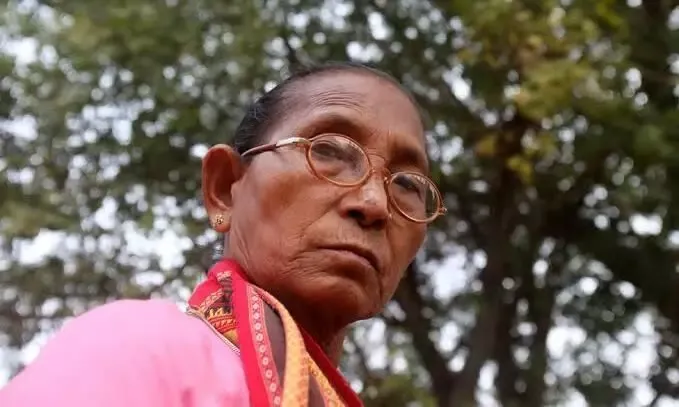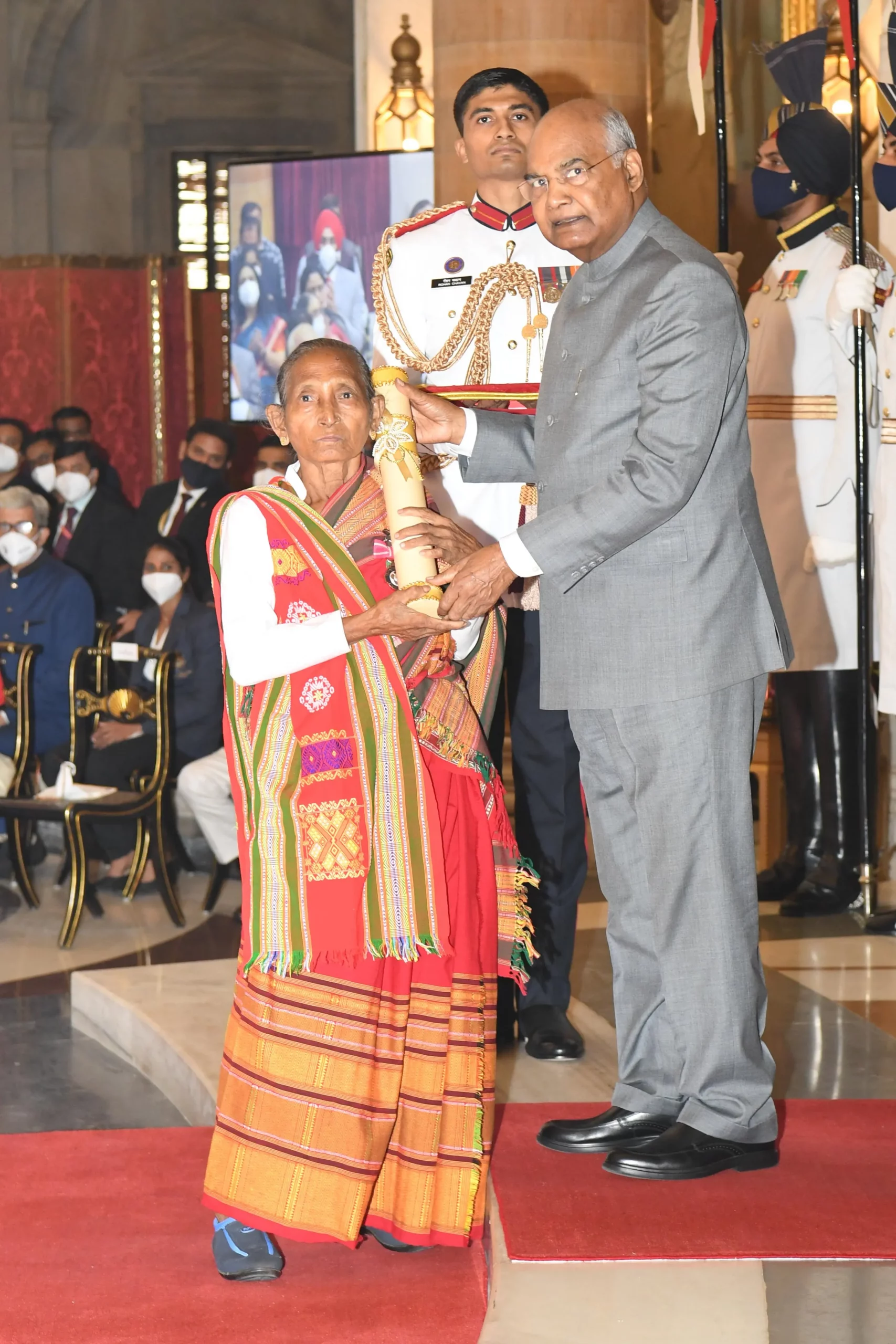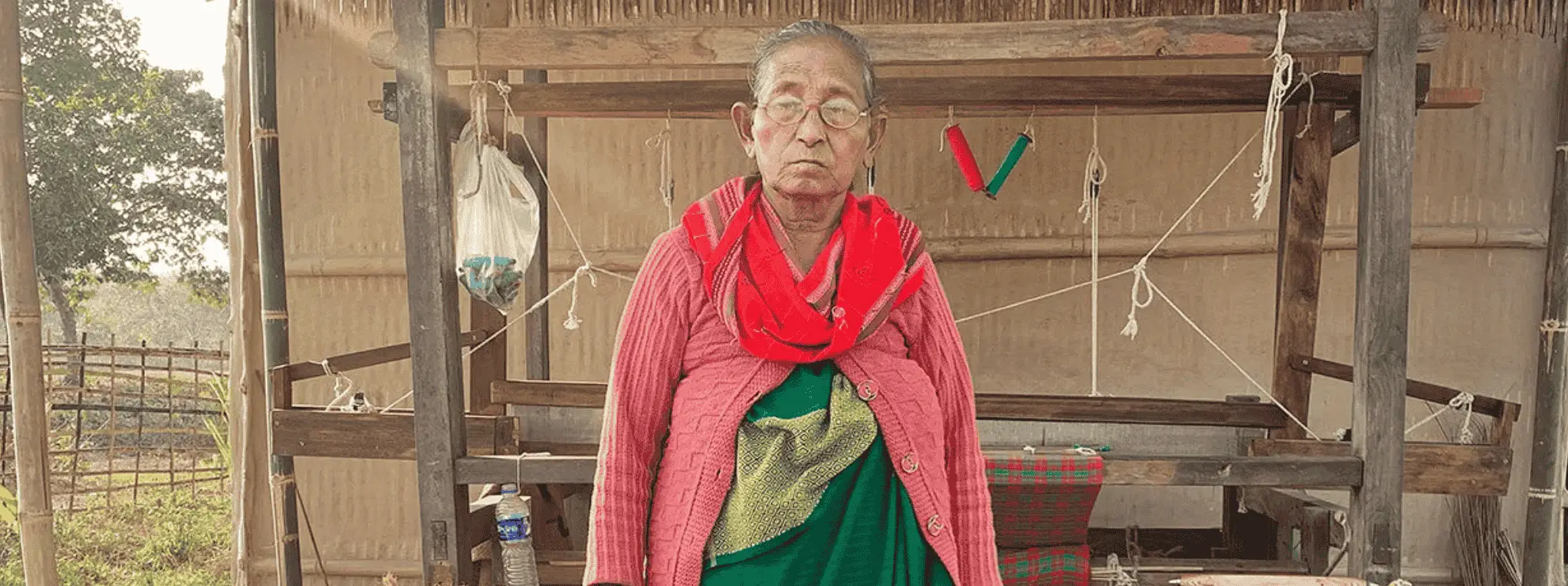(October 1, 2024) Dharmeswar was burning with fever, his skin hot to the touch. His stomach cramped violently, and waves of nausea left him unable to eat. His mother, Birubala Rabha, was beside herself with worry. Their family was poor, and access to medical help was nearly impossible in the remote, Assamese village of Thakur Billa, where the family lived. As was the norm, the parents carried their son, Dharmeswar, who was also mentally ill, to the local traditional healer. They were told that their son had been “possessed by and had married a fairy, who was also pregnant with his child. When the child was born, the quack said, Dharmeswar would die. He was given three days to live. His heartbroken mother, Birubala Rabha, was left to prepare for her profound loss. Fortunately, Dharmeswar long outlived his three-day deadline. However, his mother Birubala did not want to let the suffering heaped upon her go in vain.
With a tiny frame, a girlish laugh and a heart of fire, Birubala Rabha became a one-woman army for the voiceless tribal women in Assam. Her fight was a tough one – she took on the local quacks who held sway over communities through fear and superstition and a society that did not want to accept the truth. But most importantly, she took on the women themselves, once remarking that women can be their their own worst enemies. During her lifetime, she has rescued around 60 women from witch-hunts across Assam, and travelled the state to spread awareness, becoming instrumental in 2015 legislation which criminalised witch-hunting. The Global Indian was nominated for the Nobel Peace Prize (although this didn’t affect her much), and in 2021, received the Padma Shri from the government of India.

Birubala Rabha
Victim to fighter
After seeing her son and her brother become victims of these quacks, Birubala Rabha realised they were nonsensical at best, and dangerous at worst. But what could Birubala Rabha do? She had known nothing but poverty and deprivation, all her life. Born in 1954 in Thakur Billa, her father died when she was six years old, and the young girl had to drop out of school to help her mother run the house. At the age of 15, she was married off to a farmer, with whom she had three children. After her marriage, she stayed at home, weaving and looking after the kids.
Moreover, there was a time when even Birubala believed there was truth in these witch hunting claims. However, when she heard that a number of women had been branded witches in a neighbouring village, she couldn’t sit in silence any longer. “That is when I woke up. I went to the village and found that the women had been abused and were on the verge of being thrown out,” Birubala told the BBC. “I met the local leaders and related the story of my son. I told them there were no witches in this world, and the women should not be harassed.”
Fighting the witch-hunters
When she began her activism, nobody wanted to take her seriously, but Birubala Rabha was a woman with a mission. Moreover, it was her own gender that suffered the most due these oppressive beliefs (ironically, the Rabhas have a matriarchal society).
Birubala’s views made her the object of ridicule. Even her family faced the consequences, and found themselves isolated by their community at home but they stood fiercely by her, joining forces with Mission Birubala to spread awareness. The hill tribes of Assam, the Rabha being one of them, continue to hold a strong belief in magic, witchcraft and animistic rituals. Mysterious or sudden illnesses, especially among children or livestock, are blamed on witches. So are natural disasters, epidemics, and even family disputes. Older women, widows and even women who live alone are usually the targets of witch-hunts, especially if they are seen as socially isolated or ‘strange’. And it’s the traditional healers or quacks, who dole out advice on everything from illnesses to family disputes, are responsible for perpetuating this system of magical thinking.
A woman on a mission
Birubala abandoned her post at the homestead and began her travels as a crusader. She formed the out Thakurvila Mahila Samity, a woman’s association to raise awareness of various social hills, witch-hunting included. She spoke at meetings, she held awareness camps and went to schools to teach children about the dangers of superstition and the fallacies of witchcraft. She even stormed police stations, demanding that they protect women from this endless witch-hunting. “Women have to fight against superstitions, women have to be vigilant. When you become sick, go to a doctor, not a quack,” she has proclaimed. “Don’t have blind belief in rituals and worships… Women can sometimes be their own worst enemy.”
In 2006, Birubala became involved with the Assam Mahila Samata Society. Five years later, she founded Mission Birubala, a non-profit that comprised social activists, survivors and lawyers. Like the Thakur Billa Mahila Samiti, the aim of the non-profit was to educate and spread awareness against witch hunting, and also to support and protect both survivors and potential victims of witch hunts. Birubala soon observed that witch-hunts mostly target poor women, and superstition was merely a weapon to get rid of people in order to grab their land and properties. Jealousy of someone else’s success, property disputes and even resentment of women who did not appear to conform were all triggers.
In 2013, Birubala arrived in Majuli, the world’s largest river island, where 35 women had been branded as witches. They had paid huge sums of money to the local quack, who had prmised to “get rid of the devil’ – it was either that, or leave the village entirely. “We went to the police, invoked the law, and saved the women. Then we found that this was a money-making racket run by the local quack,” Birubala said later. According to the BBC, one victim, Podumi Rabha, had been branded a witch because her husband’s pharmacy was threatening the quack’s business. “They will always find new reasons to brand owmen as witches,” Birubala said. “But don’t be scared. Challenge the offenders and report them to the police. This battle is not going to end anytime soon.”
Victories, big and small
After years of hard work, much of which brought her ridicule within her community, Birubala’s efforts paid off – she has rescued dozens of women from witch-hunts. At the time of her death in 2024, that number stood at 55.
Her biggest victory, however, is the enactment of the Assam Witch Hunting Act of 2015. Now, every offence related to witch-hunting is cognizable, non-bailable and non-compoundable, and comes with a maximum imprisonment of seven years. Birubala Rabha was nominated for the Nobel Peace Prize in 2005, and received an Honorary Doctorate from Guwahati University. In 2021, she was conferred with the Padma Shri.

Birubala Rabha receives the Padma Shri from former President Ram Nath Kovind
Birubala Rabha passed away in May 2024, after a three-year long battle with cancer of the oesophagus. She was 70 years old. Her passing was mourned widely, and Assam CM Himanta Biswa Sarma expressed his condolences on social media. “Through her untiring efforts to end social evils, she illuminated the paths of scores of women with hope and confidence,’ he wrote.
She is survived by her son and brother, both of whom are victims of witch-hunting also. However, they continue to fearlessly lead Mission Birubala, and although they still face extreme hostility, they are determined to keep fighting. They know that’s what Birubala Rabha would have done.
